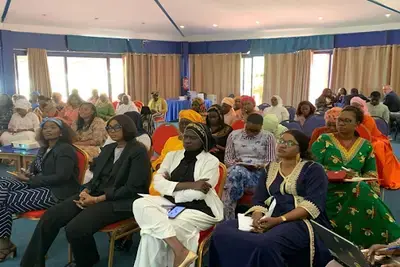
Success Story
Nigerian Elections Hold the Promise of Setting New Integrity Standard, NDI Mission Finds
Nigeria’s just-completed presidential and National Assembly elections "represent a step forward from seriously flawed elections of the past" and "hold the promise of setting a new standard for integrity in Nigeria’s electoral process," NDI said in a statement from Abuja, Nigeria.
Noting the commitment and dedication of Nigerian voters who faced long lines and high temperatures to cast their presidential ballots on April 16, NDI said the polls appear to mark a turning point for Africa’s most populous country.
But the Institute also cited a number of important problems that need to be addressed before the upcoming state elections April 26 and in the longer term. The delegation’s report contains both short- and long-term recommendations for improvements.
"Continued vigilance is still needed through the completion of the 2011 election process to realize the promise of these polls," NDI said. The Institute cautioned that its findings were preliminary, noting that serious irregularities can emerge later in the process.
The leaders of NDI’s observation mission to the presidential election were Joe Clark, former prime minister of Canada; Mahamane Ousmane, former president of Niger and former president of the ECOWAS Parliament; Robin Carnahan, secretary of state of Missouri (USA); and Christopher Fomunyoh, NDI senior associate and regional director for Central and West Africa.
They headed a delegation of 30 observers from 14 countries who were deployed in all six of Nigeria’s geopolitical zones to observe the presidential voting. NDI fielded a larger observation mission for National Assembly elections on April 9. That delegation issued a preliminary statement April 11 that said those polls provided a real opportunity for citizens to exercise their right to vote while pointing out substantial problems.
For the presidential election, NDI specifically singled out the "effective and committed leadership" of the Independent National Electoral Commission (INEC), which it said was a key factor in the improvement over previous polls. "The delegation commends efforts by INEC staff at all levels to improve transparency and credibility," the statement said. It also recognized the actions of political parties and their supporters, security forces, citizen election observers and other civil society organizations, and voters themselves that contributed to the integrity of the two April polls.
Observers also applauded the "dedication and neutrality" of polling station staff, most of whom were National Youth Service Corps members. "These staff showed initiative and increased confidence in addressing challenges that arose on election day," NDI said.
"Millions of Nigerian citizens met their civic responsibility with great enthusiasm and perseverance through their presence in polling stations across the country on election day," the report said. "The delegation applauds this dedication and encourages continued engagement by citizens in upcoming elections and other political processes."
But problems remained, such as overwhelming crowds in some places that interfered with voting, intimidation and harassment of some domestic election observers, and a cumbersome, multi-tiered process for collating election returns. "The responsibility to combat negative practices, such as vote buying, electoral malfeasance, intimidation and violence, rests not only with INEC, but with all sectors of Nigerian society," the statement said.
The delegation noted that INEC acted swiftly in the week between the April 9 and April 16 elections to address shortcomings in the electoral process, and it recommended that the following actions be taken by INEC, political parties and security services before Nigerians next go to the polls April 26 to elect governors and members of state assemblies:
- Split all polling places with over 500 voters into sub-units to improve efficiency and access to the process;
- Standardize implementation of procedures in all states and local government areas;
- Ensure security, sufficient staff and adequate facilities for collation centers;
- Follow through and prosecute electoral offenders;
- Respond to increasing needs for better crowd control in ways that neither intimidate voters nor compromise the secrecy of their ballots in cooperation with polling station staff;
- Protect the rights of INEC-accredited citizen observers, including their right to move freely on election day and to access all aspects of the process;
- Rigorously follow and abide by provisions of the Code of Conduct prohibiting acts of violence, intimidation of voters and other violations of the Electoral Act;
- Refrain from extrajudicial and violent rejection of election results and use peaceful, legal means to resolve electoral disputes; and
- Submit names of agents assigned to represent parties at each polling unit.
NDI’s mission also builds on a pre-election assessment that NDI conducted in October. The Institute’s election observation mission in Nigeria is funded through a grant from the U.S. Agency for International Development (USAID).
NDI has been working in Nigeria since 1999 and has fielded international observation missions to previous elections there in 1999, 2003 and 2007. The Institute also is conducting other election support activities with the support of USAID and the United Kingdom Department for International Development. These include a program to help Nigerian civic groups train and deploy thousands of domestic election observers. This effort includes Project 2011 Swift Count, an initiative in which observers conducted a parallel vote tabulation (PVT).
Related:
- Read the preliminary statement»
- Despite problems, National Assembly elections give Nigerians a real chance to vote, NDI mission finds»
- NDI international election mission to observe April 9 Nigerian National Assembly polls»
- Nigerian citizen observation groups boosts confidence in registration exercise»
Pictured above: A voter in Abuja
Published April 18, 2011



